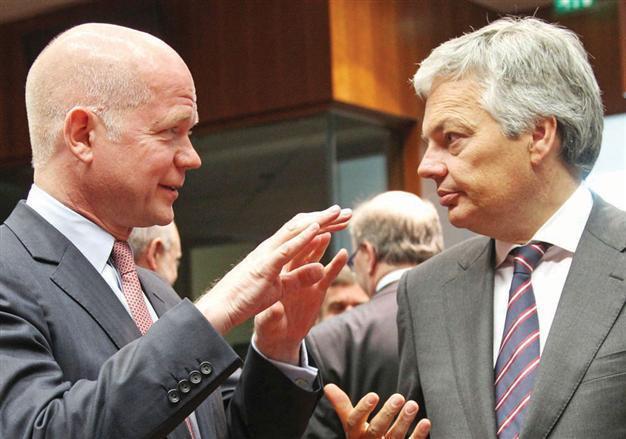EU split on Syria arms block
BRUSSELS

British Foreign Secretary Hague (L) talks with his Belgian counterpart, Reynders, in Brussels. AP photo
EU foreign ministers went into talks yesterday sharply divided over lifting an embargo to arm Syrian rebels as U.K. Foreign Secretary William Hague gave signals of applying their independent sanctions policy if the bloc cannot agree on a common Syria policy.Britain and France are pushing hard for the easing of the arms embargo to support rebels ahead of a peace conference sponsored by the United States and Russia expected next month. Hague said standing still was no option and that the moderate opposition needed to be boosted.
“It is important to show we are prepared to amend our arms embargo so that the [Bashar] al-Assad regime gets a clear signal that it has to negotiate seriously,” he said in Brussels. “If we can’t have common EU policy on Syria in future, each country will have own sanctions policy.”
Austria leads the camp of five of the EU’s 27 governments firmly opposed to sending arms that they believe could deepen the two-year-old Syrian conflict. Opponents say taking a decision now to allow arms to be sent to the rebels could undermine the planned peace conference.
“We just received the Nobel Peace Prize and to now go in the direction of intentionally getting involved in a conflict with weapon deliveries; I think that is wrong,” Austrian Foreign Minister Michael Spindelegger said. “To turn and reverse our line would not help in the conflict.”
Dutch Foreign Minister Frans Timmermans said he and German counterpart Guido Westerwelle were leading the search for a compromise.
“The positions are far apart,” Westerwelle said, adding that it was not clear if the ministers would reach an agreement on the issue.
Any decision would require unanimity among the 27 member states, but failing to come up with a decision would leave options for individual member states open and show a deeply divided EU to the whole world. The ministers must find a solution before the expiry at midnight May 31 of a far-reaching package of EU sanctions against the al-Assad government, including the blanket arms embargo.
“If there is no compromise, then there is no sanctions regime,” said Spindelegger. “In my view, that would be fatal, also for those who now absolutely want to deliver weapons.”
A paper drawn up by EU diplomats set out a possible compromise under which EU governments would agree to lift the arms embargo, but to suspend the lifting for a year, according to an EU diplomat.
But after two months, the EU would agree to look at the situation again and consider whether to lift the embargo immediately, the diplomat said. That would allow time to see whether the planned peace talks produced any results.
Compiled from Reuters and AP stories by the Daily News staff.
















